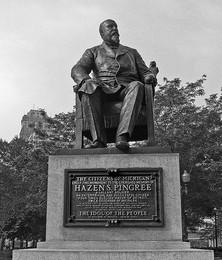
Econ Talk is at it again, applying economic theory to real problems, not getting hung up on matters historical or spatial. In the most recent episode, Edward Glaeser of Harvard talks with regular host Russ Roberts about the problems of Detroit. They do make some valid points about economic development, such as the need for adequate basic services rather than flashy new projects, and that a city which has lost a lot of population probably doesn’t need additional infrastructure (but reluctantly agreeing that perhaps some repair or modernization might be good.)
But the main theme seems to be privatize, privatize, and privatize, which includes giving public money and public assets to private operators (such as charter schools), and funding infrastructure and services from direct user fees, exemplified by toll roads. Curiously they don’t say much about taxes, not even asserting that lower taxes are needed, and certainly they betray no knowledge of the value of taxing land.
It’s interesting, if disconcerting, to compare this to “quite possibly Detroit’s finest mayor,” Hazen Pingree. This January 6 2013 Detroit News article tells the story. Having built a successful shoe-manufacturing business, Pingree found himself drafted by Republicans in 1889 to run for mayor against the dominant Democrats. He won, and started working to improve the city. Republicans, having a fair share of the monopolies and sweetheart deals that Pingree wanted to eliminate, were not pleased. But he turned out to be a skilled politician, was elected three more times as Mayor, then twice as Governor of Michigan.
Detroit at the time of Pingree’s election had few paved streets, mainly because paving had to be paid by the owners of adjacent property (and was done by politically-connected contractors). Pingree’s solution was to use the City’s general tax revenues, not only for streets but also for sewers and other infrastructure needs. His remedy for a failing public school system was to arrest the school board. His preferred tax policy: A single tax on land value, no special deals (one of his important reforms as Governor was to bring about proper taxation of railroad property.) More about Pingree at Wikipedia, with additional links there.
None of this means that the interview isn’t worth listening to, but let’s remember, everything takes place at a location, every useful urban location has value, and the value rightly belongs to the community who creates it.